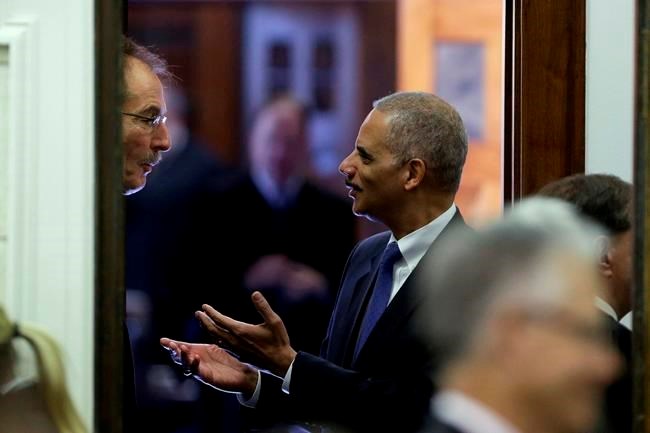IOWA CITY, Iowa — A federal judge in Iowa who has warned against political corruption is ridiculing President Donald Trump’s pardons, including those issued to convicted Republican campaign operatives and former members of Congress.
“It’s not surprising that a criminal like Trump pardons other criminals,” senior U.S. District Judge Robert Pratt of the Southern District of Iowa told The Associated Press in a brief phone interview Monday. In a bit of
Pratt was referring to pardons Trump granted to his former campaign aides convicted during the special counsel's Russia inquiry, former GOP congressmen who committed crimes, and security contractors convicted of killing innocent civilians in Iraq. Trump also pardons turkeys — this year two from Iowa — annually before Thanksgiving.
Pratt has been on the bench since his appointment by President Bill Clinton in 1997. He has had a reduced caseload since 2012, when he assumed senior status.
Pratt made the remarks when asked for comment on pardons granted to two former top aides for Ron Paul’s 2012 presidential campaign, who were convicted in a corruption scheme related to the Iowa caucuses.
He noted that the framers of the U.S. Constitution sought to stop U.S. officials from “enriching themselves” while in office by banning gifts and payments from foreign powers. Ongoing lawsuits have accused Trump of illegally profiting off the presidency through his luxury Washington hotel. A White House spokesman declined comment on Pratt’s remarks.
Trump last week pardoned Paul campaign chairman Jesse Benton and campaign manager John Tate, who were convicted at trial of concealing $73,000 in payments that went to state Sen. Kent Sorenson in exchange for Sorenson’s endorsement of Paul. Benton and Tate were sentenced to six months of home confinement and probation.
Sorenson was an up-and-coming conservative, and he made news when he defected as Michele Bachmann’s campaign chairman to endorse Paul days before the 2012 caucuses. Paul’s campaign and Sorenson denied that any money would change hands. Only later did the public learn that Paul’s campaign secretly paid Sorenson, routing the money through a film production company as “audio/visual expenses” to conceal its true nature on disclosure reports.
Pratt oversaw Sorenson’s case, sentencing him to 15 months in prison in 2017 even though prosecutors recommended probation after Sorenson pleaded guilty and agreed to
Pratt did not oversee the trio’s trials. But he issued a lengthy opinion detailing his reasoning for sending Sorenson to prison, saying Monday, “I couldn’t believe what was going on.”
Pratt noted in the opinion that Sorenson took secret payments — $133,000 from the Bachmann and Paul campaigns — while serving as a state official. He said those who abuse positions of public trust for personal gain must face severe consequences, in order to deter misconduct and promote public confidence.
Otherwise, he warned, “political corruption will slowly corrode the foundations of our democracy until it collapses under its own weight.”
The White House noted in a statement that the pardons for Tate and Benton were supported by Paul's son Kentucky Sen. Rand Paul and Lee Goodman, former chairman of the Federal Election Commission, who said the “reporting law violated was unclear and not well established.” An appeals court that upheld their convictions in 2018 rejected that argument.
Neither Sorenson nor Kesari received pardons, but Republican Gov. Kim Reynolds restored Sorenson’s right to vote and hold public office earlier this year.
Ryan J. Foley, The Associated Press



